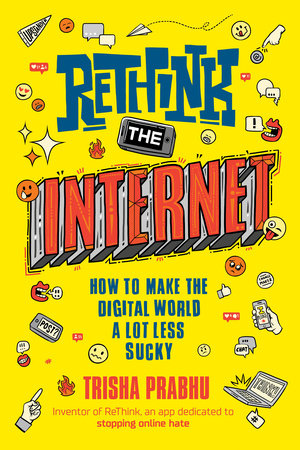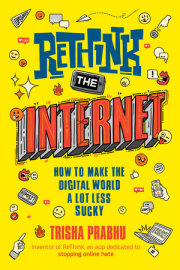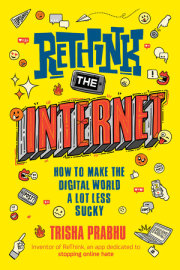Welcome to This Book: Meet Me, Trisha Prabhu
Hey, there! What’s up? Welcome to this book! You might be here for many reasons: (1) you think the internet is kinda sucky (I couldn’t agree more) -and you want to change it, (2) you want to learn more about the internet and technology (which, even though it’s everywhere, is still kinda complicated . . .), or (3) . . . let’s be real: some adult you know bought this book for you. Whichever of the three it is (and maybe it’s more than one), I’m so excited you’re here! Here’s what that adult didn’t know when they bought this book: I’m a young person, too, so I hate the lecturing, cringey, sappy “life lessons” just as much as you do. Let me start, then, by being clear: that’s not what this book is about. It’s also not here to make you use your phone a certain way, or to claim that technology is “bad.” (Straight up, the only folks who think that are . . . well, old people.)
With all of that said, what is this book about? And why should you read it? Simply put, this book is designed to be an internet “survival guide.” In this book, you’ll find everything you need to know to be a successful digital citizen (and if you’re wondering what that is, take a peek at chapter 1). Today’s internet might seem pretty simple: hop online, chat with friends, watch videos, do your homework . . . but the internet—-and technology more broadly—-is much messier than you might realize. This book is meant to teach you seven main skills, which, if you master them, will ensure that the internet never gets the better of you. In other words, you can use tech to be awesome, instead of running into trouble you later regret.
Okay, maybe I have your attention. But if I were you, I’d still be kinda skeptical: Who is this girl? And why does she get to teach me how to use the internet? Good questions. That’s what this part of the book is for. To get to know me, your internet instructor: the one, the only, the myth, the legend . . . Okay, I’m not that cool, so I’ll skip the dramatic intro—-my name is Trisha Prabhu, and I’m here to teach you how to do the internet right.
I’m originally from Illinois. I was born in Arlington Heights, which is a city in the suburbs of Chicago. My parents, Neel and Bhanu Prabhu, immigrated to the United States from India in the 1990s. A few years after they met, they got married, and in May 2000, the world was forever changed: *dramatic pause* I was born. A couple years later, we moved to the city I now call my hometown: beautiful Naperville, Illinois, another suburb of Chicago.
It was in Naperville that I first started to make friends, find interests, and, well, become who I am! Of course, my interests changed just as quickly as I did. At six, I wanted to be a queen—-and command folks to make my favorite foods all day long (I can’t lie, that’s still what I want to be . . . but I know it’s not going to happen. *Sigh*). At seven, I wanted to be an author (and will you look that—-dreams do come true!). At eight, I wanted to be a basketball player, a sport I then played competitively. I dreamed of joining the WNBA, where I hoped to play as a power forward! And at nine, I wanted to be the president of the United States. It was around that age that I started to think more critically about the world’s issues: global warming, gender equality, promoting kindness and respect. And it was then that I realized: When adults asked me what I wanted to be when I grew up, I didn’t really know, but I did know that whatever I did, I wanted to solve important problems. I wanted to make change. I wanted to make an impact.
And then, at ten, perhaps the most important thing to ever happen to me happened: I was introduced to the incredible world of computers and coding! For those of you who don’t know, computer programming, or “coding” as it’s more informally called, is basically the act of talking to a computer. You can almost think of it as speaking in a foreign language—-the language of computers! Whether you want to build a website dedicated to cat memes or a social media app for Michael Jordan fans, you need to be able to tell your computer what it should create—-but unfortunately, it doesn’t know any human languages. Coding is what helps bridge the gap.
Rather quickly, I fell in love with coding. Why? Well, for one, as a kid I’d always hated math (argh), and coding was the first logical, quantitative thing I really enjoyed. For another, it was so awesome to actually be able to build a piece of technology, technology that people around the world could see and use. It truly was the best feeling: I’d always end a coding session feeling powerful and engaged. In any case, it was soon pretty clear: this wasn’t going to be a hobby or a phase; it was going to be something I did for the rest of my life.
When I turned eleven, other things in my life started to change—-and unfortunately, not for the better. I found myself embroiled in “girl drama” at school—-something, I imagine, many of you might be familiar with (take it from me: it gets better). Apparently, my friends didn’t think I was “cool enough” anymore. Without warning, I found myself without real friends, support, or anyone who truly liked me for me. I’d often eat lunch with my teachers, which, apart from being super embarrassing, actually ended up being a blessing: with them, I found a lot of solace.
Unfortunately, things only got bumpier from there: My former friends started to tease and harass me—-excluding me, talking about me behind my back, and even playing tricks on me. My phone, which I’d gotten just a little while before, ended up being a big part of it: I’ll never forget the day I got a text from someone I thought was my crush. Eagerly, I responded, thrilled that they’d gotten my number—-and were texting me! I was on cloud nine . . . but I wasn’t there for long. Later that day, I learned that those texts were never actually from my crush; in fact, it’d been three girls from my school, including two of my former friends, pranking me. They seemed to think it was hilarious, but I was crushed—-and felt like an idiot. I didn’t think it could get worse, until the next day, when I arrived at school and found them showing my classmates screenshots of our texts. “She’s so lame,” I heard one girl say. “Yeah,” the girl next to her agreed. “This is literally pathetic. Did she really think he would be interested?” They all laughed. Funnily enough, when they realized I was standing there, they hastily stuffed their phones away and fell silent, masking their smiles. One even complimented me. “Wow, Trisha! I love that skirt.” The others nodded. I remember realizing: it’s not that they don’t know that what they’re doing is wrong . . . just that somehow, on a phone, it’s easier for them to be cruel, unkind, and mean.
It was a tough period for me. I don’t know if you’ve ever felt this way, but back then, I often felt like the world was my mirror: things people said about me stuck with me and would influence how I saw myself. I started to believe those girls—-maybe I was lame, pathetic, imperfect, and unwanted. I lost a lot of my confidence, my spirit, and the positivity that was once integral to my personality. And more than anything, I hated my phone: a constant reminder that I just wasn’t good enough, whatever “good enough” was.
Maybe you’ve been through something similar to what I went through, or maybe you’re lucky enough to have avoided some of the worst of middle school (once again, I swear: it gets better). In any case, you have to agree: middle school isn’t the only problem here . . . As those girls demonstrate, a sucky internet is definitely part of it too.
At first, I didn’t think about it that way. Thanks to that “mirror” effect, I thought there was something wrong with me, that I was the only one who’d ever been bullied or harassed like that. It was only a few years later, at thirteen, when I realized that that couldn’t be further from the truth. One day after I came home from school, I was browsing the internet and stumbled upon a story about Rebecca Sedwick, a twelve--year--old girl from Florida. The article said she’d been cyberbullied for over a year and a half, after which she dropped out of school and suffered from serious mental health issues that caused her death by suicide. I was shocked; it seemed unreal to think that kids were being driven out of school and even killed because of what they’d been sent on social media! I immediately started to do more research—-and that’s when, for the first time, I learned about the scope of this issue: every day, millions of young people around the world receive mean or hurtful messages on the internet . . . partly because, well, it’s just so easy to be mean online. Technology, it seemed, was enabling the spread of hate at pandemic proportions.
I was shocked—-and fired up. You know that feeling when, well . . . you just have to do something about a problem? That’s how I felt. I couldn’t let this go; I refused to let a sucky internet reign even a minute longer! Somehow, someway, I pledged to myself, I was going to fix this thing. (Cue the heroic Disney music!)
That left me with just one important question to answer: How the heck was I actually going to do that? I was a teenager, with no resources, experience, background, or skills. Except—- Wait! I quickly realized that that wasn’t true: I have the all--powerful skill of coding! And so—-contrary to most anti--hate work to date—-I started to seriously think about how I could use technology to solve this issue, an issue that technology itself created.
After months of brainstorming, building, and experimentation, I had the answer, and my solution, which I named “ReThink,” was born. The concept was simple: I knew that a lot of young people (myself included!) were prone to making rash, sometimes silly decisions—-and it’s not all our fault (at this age, our brains aren’t actually designed to be super thoughtful). I hypothesized that that effect could’ve possibly translated to the internet: in other words, staring at a phone—-rather than someone’s face—-made it even easier to let bad decision--making take over! What I wanted to create was a brake: something that would give a user a chance to pause, review, and rethink saying something mean, before the damage was done. I developed a vision: If someone tried to text me “I hate you!” their phone would receive an alert. hold up! are you sure you want to say that? that’s not cool. The technology could function as an app—-an app that gave young people a chance to do the thing they already knew was right.
So that’s exactly what I did: computer in hand, I got to work coding. I later found that the ReThink solution was extremely effective: almost everyone who received a chance to rethink a mean message changed their mind and decided not to say it! (Move over, Thomas Edison—-there’s a new inventor in the house.)
From there, my little idea ballooned into a global movement. A year later, I found myself running a company, giving talks about my work on stages around the world—-from the White House to ABC’s Shark Tank—-and leading anti--hate awareness campaigns. Without meaning to, I’d stumbled upon a way to do what I’d always wanted to do—-make an impact, especially on really important issues—-and as a teenager, which was super awesome.
And that’s how I find myself here, writing to all of you! In my many years of trying to fix this thing we call the internet, I’ve seen it all and learned a lot. And I want to share that knowledge—-as well as my handy digital tricks and tips—-with all of you.
Okay, Trisha, you might be thinking. Seems like you know what you’re talking about. But seriously, do I really need to read this book?
The short answer? Yes. But I’m not sure that’s satisfying, so here’s the long answer: Our generation (sometimes referred to as “Gen Z”) is the first to be born into a world of technology, but we won’t be the last. Technology and the internet are here, and if you ask me, they’re here to stay. And that’s a good thing: For the most part, your phone, your computer, and the internet you access through those devices are great, right? You can learn about new topics, connect with friends, and even create some hilarious memes. But part of learning to live in a new society—-in our case, a society that runs on technology—-is ensuring that you’re ready to be successful in that society. In the same way you go to school so that one day you can be successful in the “real world,” you also need a digital education in order to be an “internet insider.” Otherwise, the internet can—-and most likely will—-get the better of you, as it has so many people. And, well, that would be really sucky.
But don’t worry, there’s nothing to fear—-Trisha is here! (Okay, that was kind of lame. But hey, it rhymed—-give me some credit.) Jokes aside, I have your back. I’m here to teach you everything you need to know, in a format that’s actually fun, interesting, and informative.
In the chapters that follow, you’ll find seven stories that aim to teach you the seven skills you need to know to crush this thing we call our digital universe. Each story is paired with an Internet Challenge, so you can practice your new skills. Get ready to learn, laugh, and have a lot of fun!
I’ll see you there—-and I can’t wait. Thanks again for joining me on this journey. Let’s go!
Trisha Prabhu
Copyright © 2022 by Trisha Prabhu. All rights reserved. No part of this excerpt may be reproduced or reprinted without permission in writing from the publisher.











